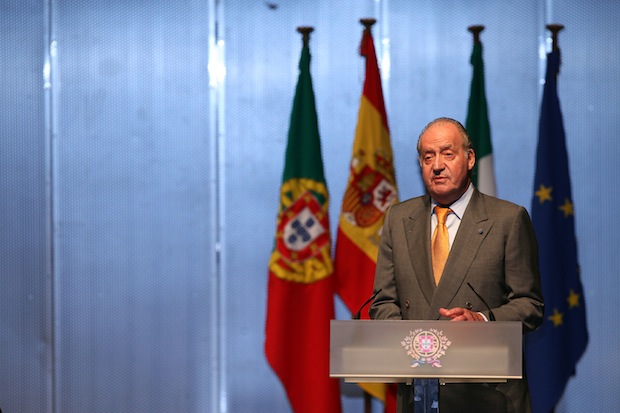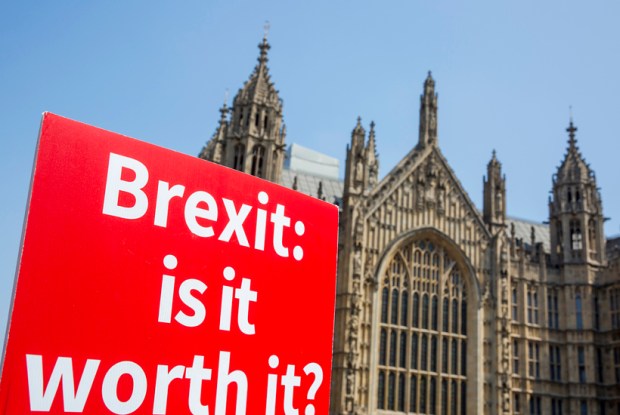Might there ever be in this century, anywhere in Europe, a case for serious political interference by an hereditary monarch?
Spaniards can surely imagine it. In 1981 the (then) recently crowned King Juan Carlos II decisively rebuffed an attempted right-wing coup and in doing so secured the country’s newly instituted post-Franco democracy: a transition in which he had been deeply personally involved. The king did more than decline to support those who would overthrow democratic government; he took a lead in demanding that they be stopped. The settled account of these turbulent months in 1981 has perhaps still to be written and may be a little more complicated than the received media wisdom; but there is no doubt the king made the right decision, and in making it settled his country’s history signally for the better. The importance of his intervention is impossible to exaggerate. He saved Spain.
I would submit that now, 33 years later, circumstances have arisen again in which the King of Spain could and should act to save his country. This time, as last time, there is a need to restrain the right; but this time the crisis, though huge, is less apparent. This time, as last time, only a figure commanding great respect on the right can do it. There was something paradoxical about a figure whose standing was highest among the right taking the position calculated to disappoint them: Juan Carlos surprised Spanish conservatives in 1981 and dismayed many of them. But they listened. They would listen to him today.
He needs to talk to them about Catalonia, whence I have just returned. Catalans are shouting for full independence; first they want a referendum, but this is denied to them by Madrid, which says it would be unconstitutional — a view that has just been upheld by the highest court.
Few outside Spain understand, I think, how deep is the looming rift between Spain and one of her wealthiest and most productive regions and nations. This is far more serious than Lombardy in Italy (which will never really secede) or Corsica in France (whose amputation is unlikely but would anyway be bearable) or even Scotland, which is unlikely to secede but whose secession would not wreck the residual part of the United Kingdom. The Catalan problem is as big as the Basque problem was (though less explosive) before a combination of crackdown and compromise edged the situation out of danger. It can be compared with Flanders vs Wallonia in Belgium. It’s about language and national identity, but about economic survival too. It threatens national disintegration.
I grow tired of testing Spectator and Times editors’ and readers’ patience by banging on about the Catalans, and essentially repeating myself; but here again — with apologies for repeating myself — is the problem. ‘Catalunya’ (as they call their country) is a nation with a territory, a long history, and a distinct language (one glance at a Catalan text will assure you that this is no dialect of Spanish) which is spoken by almost all and is the first language of a majority. It is comparatively wealthy, its population has a deserved reputation for hard work and financial talent and drive, and it has an advanced industrial and commercial economy. The rest of Spain is Catalonia’s most important market, but its own revenues are an important part of the revenues of the rest of Spain. Barcelona in Catalonia is Spain’s second most important and arguably commercially its most important city. Catalonia nurses deep and long-standing grievances about the attitude of the rest of Spain to its language, culture and national identity (let us step over the arguments about justification). Catalans are no johnny-come-latelys to Europe’s would-be independent peoples.
They have a regional status, like all parts of Spain, and their own government and parliament, like Scotland; but limited fiscal autonomy. Madrid has resisted Barcelona’s demands for constitutional recognition for Catalonia to call itself a nation. What we in Britain call ‘devo-max’ is not on offer.
I believe that some kind of turbo-charged further step in devolution would settle the issue, but the positions of both sides are becoming impossibly entrenched and bitter. The leader of Catalonia’s government and largest party, Arturo Mas, whose commitment is to a referendum and independence, is under increasing pressure from more extreme and impatient separatist groupings. The Spanish Prime Minister, Mariano Rajoy, is in under very strong pressure from the right in his right-wing Popular Party to give no ground at all. Catalan ambitions irritate millions in the rest of Spain. Both leaders have become the prisoners of circumstance. Denied his referendum this year, Mas looks likely to call an early election in Catalonia in lieu of that plebiscite, but as all the big Catalan parties will have separatist manifestos the result will be a mess, from which I believe the least compromising may gain most.
Somebody needs to rise above this, and it isn’t going to be Spain’s politicians. I cringe to repeat the Italian writer Giuseppe di Lampedusa’s now-clichéd conservative wisdom but the message to conservative Spain is the same difficult advice it fell to the country’s estimable transitional leader after Franco, Adolfo Suárez, to teach. ‘If you want things to stay the same, things will have to change.’
Who better than a monarch to explain this to conservatives, and be heard? Few Catalans would suppose the Spanish royal family to be sympathetic to their cause. To find the King himself sympathetic would undermine the extremists and strengthen those many Catalans who in their hearts have not despaired of rebuilding a co-operative relationship with the rest of Spain. What more auspicious start to a ‘better together’ campaign in a Catalan referendum in which ‘in’, ‘out’ and ‘devo-max’ were the options? In those circumstances, I have no doubt that devo-max would win.
Ah well, just a dream, no doubt. But sometimes the alternative to a dream is a nightmare. The nightmare could happen: so why not the dream?
Got something to add? Join the discussion and comment below.
Get 10 issues for just $10
Subscribe to The Spectator Australia today for the next 10 magazine issues, plus full online access, for just $10.
You might disagree with half of it, but you’ll enjoy reading all of it. Try your first month for free, then just $2 a week for the remainder of your first year.















Comments
Don't miss out
Join the conversation with other Spectator Australia readers. Subscribe to leave a comment.
SUBSCRIBEAlready a subscriber? Log in